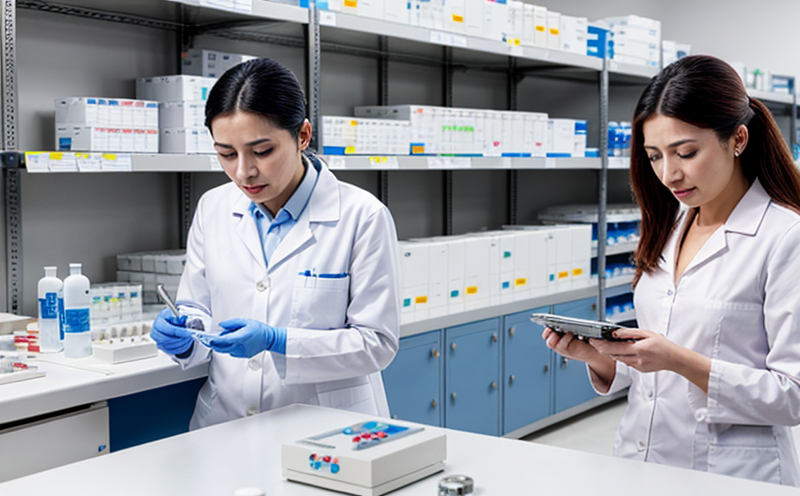USP Bioburden Testing of Raw Materials
In the pharmaceutical industry, ensuring product purity and quality is paramount. USP (United States Pharmacopeia) bioburden testing is a critical step in maintaining these standards, particularly for raw materials used in drug formulations.
The purpose of this test is to quantify the total number of viable microorganisms present on or within a given sample. This information helps manufacturers assess the potential risk associated with microbial contamination during processing and subsequent use. By identifying bioburden levels early in the supply chain, pharmaceutical companies can implement effective mitigation strategies to prevent contamination issues downstream.
Bioburden testing plays a vital role in regulatory compliance, especially when dealing with materials that will come into direct contact with patients. For instance, excipients used in tablets or capsules must meet stringent cleanliness requirements specified by USP monographs. Understanding the bioburden level allows manufacturers to make informed decisions about cleaning protocols and sterilization methods.
From a broader perspective, bioburden testing supports patient safety by ensuring that any microorganisms present do not pose a health risk. This is especially important for sterile drugs or those administered intravenously, where even minimal contamination could lead to severe adverse reactions. The test also aids in validating the efficacy of sterilization processes employed during manufacturing.
Given its significance, it's essential that bioburden testing be conducted by laboratories with expertise and experience in this area. Eurolab, for instance, offers comprehensive USP bioburden testing services tailored to meet pharmaceutical industry needs. Our team of experts understands the nuances involved in preparing samples correctly and interpreting results accurately.
One key aspect of our service is adherence to current good manufacturing practices (cGMP) regulations as outlined by FDA guidelines. This ensures that all tests are performed under controlled conditions, reducing variability and enhancing reliability. Additionally, Eurolab utilizes advanced analytical techniques such as quantitative PCR (qPCR), which allows for precise quantification even when dealing with very low levels of bioburden.
Another advantage of working with Eurolab is our commitment to continuous improvement through participation in proficiency testing programs recognized worldwide. These programs help verify the accuracy and precision of our laboratory methods, providing assurance that clients receive consistent, high-quality results every time.
Scope and Methodology
| Scope | Description |
|---|---|
| Sample Preparation | Raw materials are first cleaned thoroughly using appropriate solvents. Depending on the nature of the sample, this may involve washing with water or other suitable agents. |
| Culture Media | A variety of culture media are used to grow different types of microorganisms from the samples. These include nutrient broth for general growth and selective media targeting specific organisms relevant to pharmaceutical products. |
| Incubation Periods | The incubation period varies based on the type of microorganism expected. Common durations range from 24 hours up to several weeks, depending on whether aerobic or anaerobic conditions are required. |
| Enumeration | Viable counts are determined by plating dilutions onto agar plates and counting colonies after incubation. For more accurate enumeration, especially with low numbers of viable cells, alternative methods like qPCR can be employed. |
Eurolab Advantages
At Eurolab, we pride ourselves on offering unparalleled expertise in USP bioburden testing. Our highly skilled team combines years of experience with cutting-edge technology to deliver reliable results every time.
- Comprehensive Expertise: We have a deep understanding of both the theoretical underpinnings and practical applications of bioburden testing in pharmaceuticals.
- Affordable Pricing: Our competitive rates ensure that clients receive excellent value for their money without compromising on quality.
- Prompt Turnaround Times: We recognize the importance of timely results and strive to deliver reports within industry-standard deadlines.
- Dedicated Client Support: Should you have any questions or require additional assistance, our friendly customer service team is always available to help.
Environmental and Sustainability Contributions
Incorporating sustainability into bioburden testing enhances both environmental performance and operational efficiency. By minimizing waste generation during sample preparation, optimizing the use of culture media, and ensuring proper disposal practices, we contribute positively to our environment.
- Reduced Waste: Efficient techniques in sample handling lead to lower waste production throughout the testing process.
- Optimized Resources: By selecting appropriate culture media based on preliminary analysis, resources are used more effectively. This reduces unnecessary growth of unwanted organisms and decreases overall consumption.
- Eco-Friendly Disposal: Properly disposing of bioburden testing materials ensures compliance with local regulations while minimizing harm to the ecosystem.





